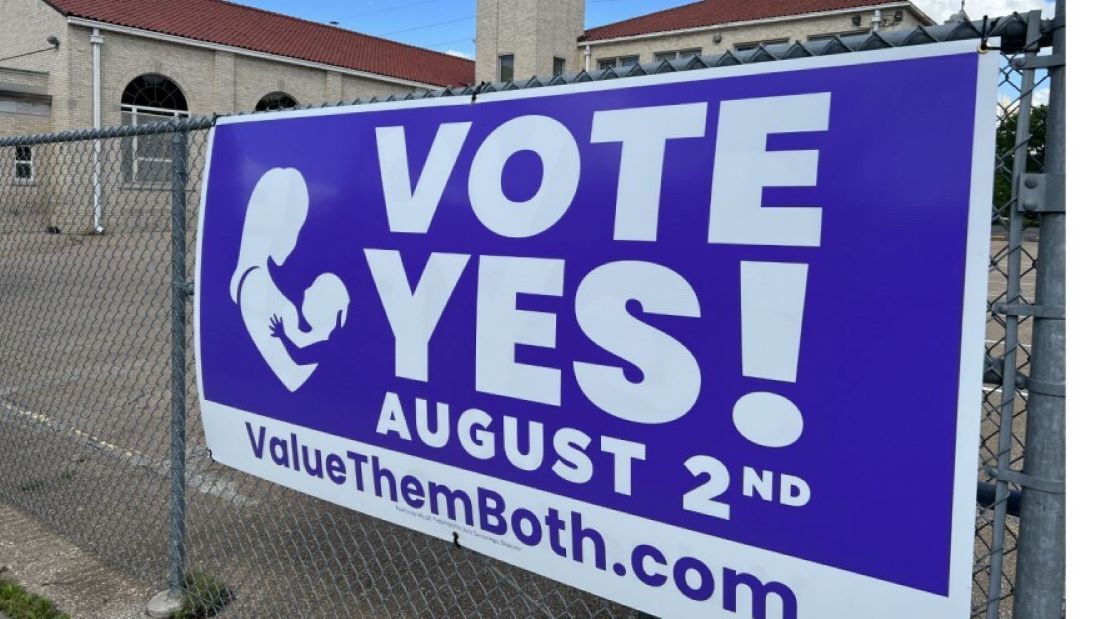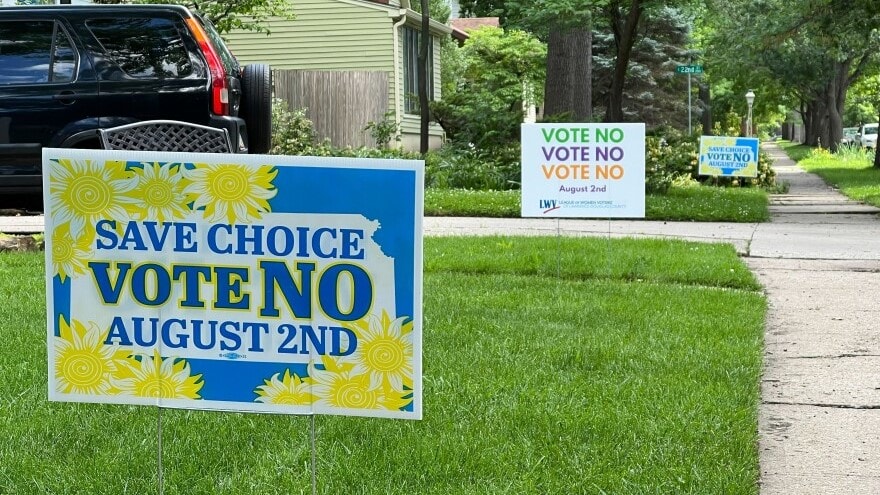Discussing the Values of ‘Value Them Both’ A Community Conversation on Reproductive Rights Hosted By American Public Square Prompted Balanced and Thoughtful Discussion
Published July 27th, 2022 at 2:19 PM
Above image credit: Zoe Schell, from Topeka, Kansas, stands on the steps of the Kansas Statehouse during a rally to protest the Supreme Court's ruling on abortion Friday, June 24, 2022, in Topeka. (AP Photo | Charlie Riedel)Next week, Kansans will vote on a proposed constitutional amendment that would ensure abortion is not a constitutional right in the state.
The amendment, named “Value Them Both,” comes just weeks after the U.S. Supreme Court overturned Roe v. Wade, making abortion rights a state-by-state decision.
In preparation for the vote in Kansas, experts gathered to discuss the language of the proposed amendment, the meaning of its values and the context in which it is being put to voters.
The virtual event was hosted and organized by American Public Square and moderated by Flatland’s Mary Sanchez.
Perhaps the most compelling portion of the discussion was around the name of the proposal.
Neal Allen, a political science professor at Wichita State University, said it’s not clear what the “both” of “Value Them Both” means.
“I have a pretty good understanding of how ‘Value Them Both’ would value fetuses as potential human lives,” Allen said. “But I’m not sure exactly if it’s clear what ‘Value Them Both’ thinks about the women…(it) makes sense only if you value women by protecting them from abortion.”

Elizabeth Kirk, a legal scholar and lecturer at Catholic University of America, represented the “Value Them Both” amendment in the discussion and was able to break down some of its language.
If passed, the amendment would mean abortion would no longer be protected by the state’s constitution. Kirk held that this wasn’t to outlaw abortion in the state, but rather to ensure the state can enact policies around abortion.
Due to the Kansas Supreme Court’s ruling in the 2019 Hodes v. Derek Schmidt case, Kansas is currently held to a “strict scrutiny” test when making laws and regulations around abortion. Kirk pointed to other states who have adopted these policies and said abortion regulation has become almost untouchable, to the point where these states later ruled state funding for abortion was necessary because the procedure was a constitutional right.
Kirk explained that was why the first line of text of the amendment states: “there is no Kansas constitutional right to abortion or to require the government funding of abortion.”
Without the amendment, Kirk argued, Kansas would be unable to draft legislation around abortion. This means anti-abortion legislation and even legislation that calls for safer abortion facilities and practices.
“I can think of at least one very important reason that I think pro-choice people would agree, values women, which is health and safety regulations of clinics, one of which has already been struck down under the Hodes standard,” Kirk said.
(The Hodes decision ruled that the dilation and evacuation method of abortion was no longer illegal in Kansas).
Flatland on Kansas City PBS
American Public Square events always feature a roving reporter to help field questions from the audience. Last night, the position was filled by APS intern Lucy Brock, who asked the panelists: “How (is) everybody in this situation being valued?”
It was certainly a poignant question to ask considering the already discussed language of the amendment.
Sandra Thornhill, a doula and founder of Sacred Organized Spaces, responded strongly to the question.
“I don’t feel valued in this legislation,” Thornhill said. “I can’t even call it a slap in the face, because it’s almost like a gut punch, again, to the BIPOC birthing community to say that we don’t care about you, and furthermore, that we want ownership over your body and ownership over the decisions (of your bodies).”
Thornhill works to help Black Indigenous People of Color (BIPOC) to seek reproductive justice.
Thornhill is a part of and works with a community of people who have historically faced high infant mortality rates and lower standards of prenatal care.
“My community (did) not have access when abortion was across the state, across the nation … and seen as a right, we were fighting just to get access,” Thornhill said. “So to continue to repeal and to continue to threaten that access and minimize it even more just shows us that you don’t care.”
Throughout the conversation, Thornhill said she looked at the amendment not for its immediate effects, but for the larger context of what it meant to her community of “birthing warriors.”
“We know who the Kansas legislature is, we know what’s going on in our nation, and we have to take all of that into consideration how this is a greater threat for the civil liberties of all people,” Thornhill said.

Jonathan Scrafford, an obstetrician-gynecologist from Wichita, Kansas, said he is confident that the medical community will be able to work with legislators to continue offering proper medical care to child-bearing persons.
He also cleared up confusing medical language around abortion, miscarriage and ectopic pregnancies. These procedures can all use the term abortion, but Scrafford clarified that miscarriages and ectopic pregnancies are medically necessary procedures that should not be affected by a complete abortion ban.
Scrafford said he’s even had patients receiving those treatments in the past couple of weeks ask him if those would be illegal should the constitutional amendment pass.
“As a provider that disturbs me not only because that wouldn’t be a direct fallout of the amendment, even if we were actually talking about abortion,” Scrafford said.
This was a point made by many of the panelists. Even if the amendment passed, laws and regulations would still have to go through the legislative process before any abortion practices would change in Kansas.
Nonetheless, Scrafford held that even if anti-abortion legislation passed, the non-elective procedures would be protected.
“Sound public policy, really is fully capable of differentiating elective termination of pregnancy from things like miscarriage management and ectopic pregnancy,” Scrafford said.
Michael Poppa, the executive director of Mainstream Coalition, rounded out the conversation by reminding attendees and panelists of the persistence of the abortion question.
“This is decidedly an issue of separation of church and state… Look at the other issues or initiatives…on other marginalized communities, not just women, they just happen to be the collateral damage in this issue, but you have anti-LGBTQ rights, anti-diversity, equity inclusion, these are all driven by that very deep crack in that separation of religion and government,” Poppa said.
Poppa said while he is a person of faith, he knows his neighbors are not. It’s important to remember, he said, that this is a nation of many religions with different values and morals.
After more than an hour of robust conversation, Sanchez asked each of the panelists, “So what?” and “Now what?”
Despite differences during the discussion, the panelists agreed that continued civil discourse around the topic of abortion and reproductive rights was essential for the future.
“Hearing from diverse voices is healthy, it’s the way we achieve compromise, without hating one another, and I think the democratic deliberative process is the way that all of the arguments that we’ve touched on tonight…get worked out best in our country,” Kirk said.
Sanchez ended the webinar with a call to action. She asked panelists and participants to go out and continue the conversation with someone who didn’t share their views.
“Ask them, ‘Why?’ Ask them, ‘What were your experiences?’ ‘How did you come to the place that you are now?’” Sanchez challenged. “I’ve always found that’s one of the best ways to interview people, and I think it’s one of the best ways to live within our society.”
Cami Koons covers rural affairs for Kansas City PBS in cooperation with Report for America. The work of our Report for America corps members is made possible, in part, through the generous support of the Ewing Marion Kauffman Foundation.



